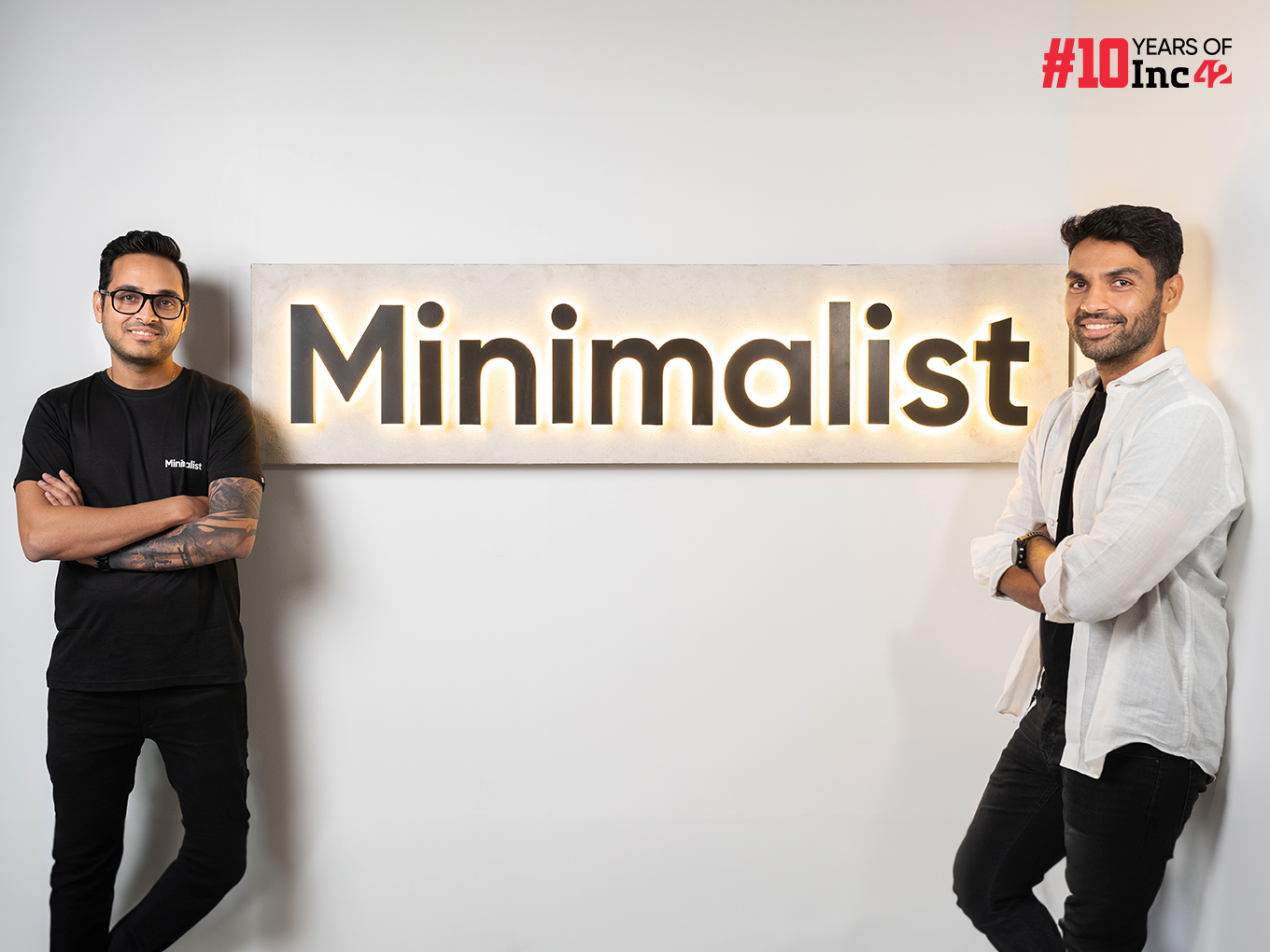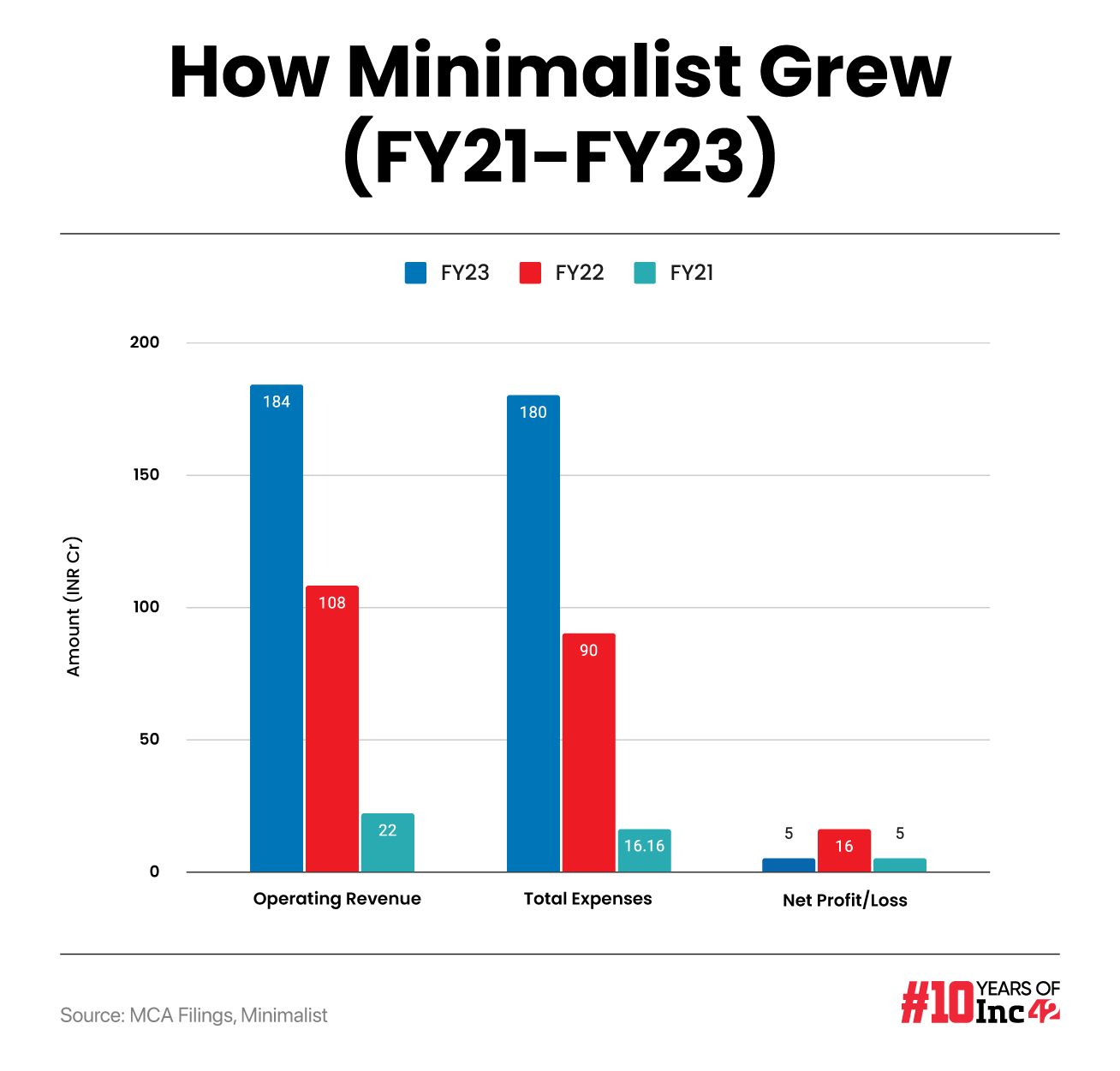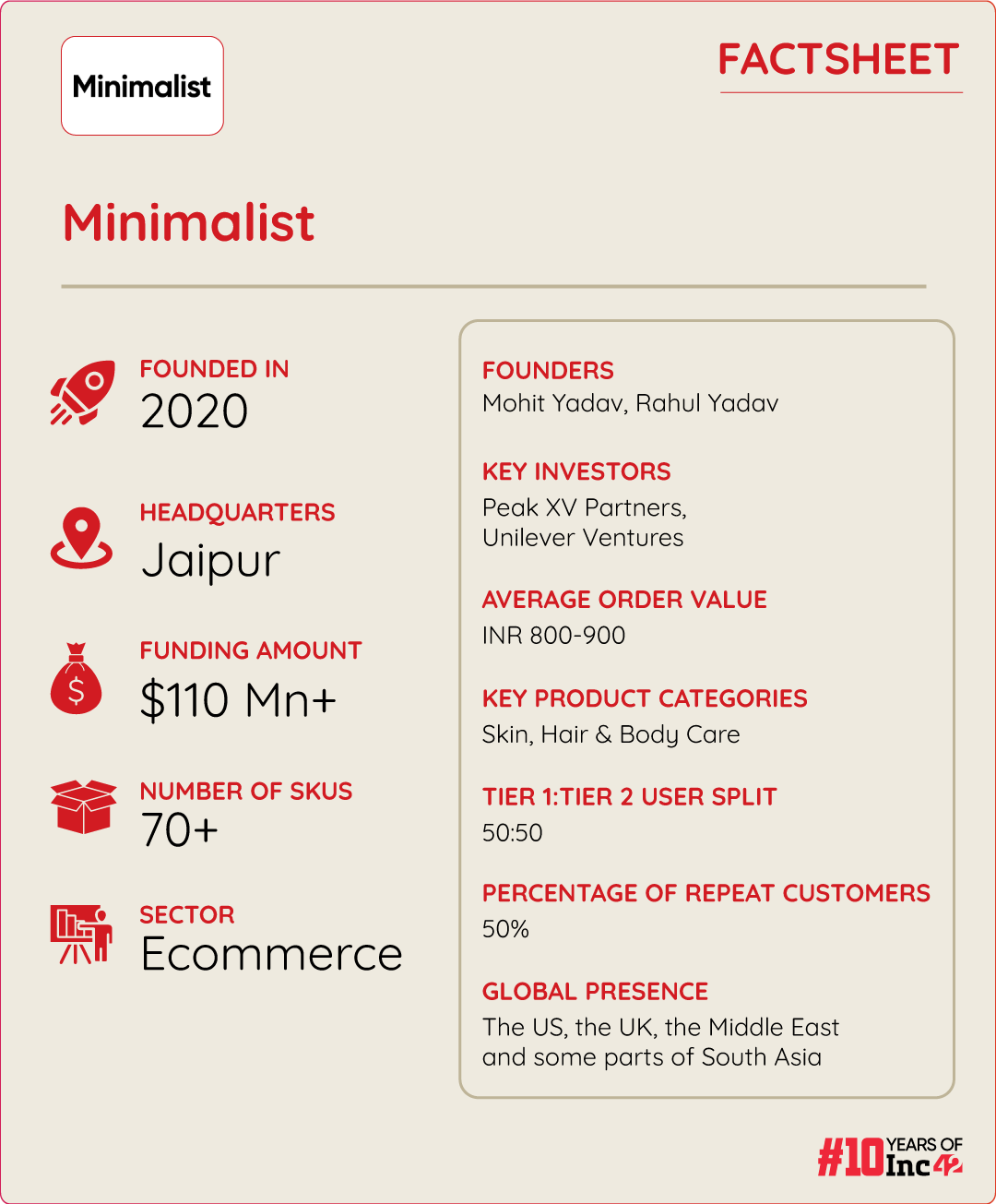How D2C Brand Minimalist Built An INR 100 Cr Business Within Eight Months Of Inception

Despite the economic havoc caused by the Covid-19 pandemic, the beauty and personal care (BPC) industry has seen the rise of a consumer clan mindful of the regenerative power of the products they use and the nature of the ingredients. The trend has continued post-pandemic, and almost every new-age brand now promises clean, green or natural-origin BPC products.
Although legacy players at home and abroad are somewhat slow to ditch their classic product lines (mostly chemical-based), India’s digital-first, direct-to-consumer (D2C) BPC market is expected to boom, riding the current trend. Pegged at $5 Bn+ in 2023, it may surpass $28 Bn by 2030.
With more than 60 new-age brands, such as publicly listed Mamaearth, IPO-hopeful SUGAR Cosmetics, and their reputed peers like Wow Skin Science, Plum, mCaffeine, Himalayan Organics, Anveya Living and 82 degree E jostling for a place in the market, the competition is getting cut-throat. The D2C players are also trying to lock horns with local and global giants like Hindustan Unilever, Himalaya, L’Oréal and P&G for a share of the overall BPC market, projected to grow to $30 Bn by 2027, per a Redseer-Peak XV report.
However, the high-octane competition has not deterred newbies like Minimalist from entering the race. Set up by the Jaipur-based siblings – Mohit and Rahul Yadav – the startup develops clinically tested and highly effective skincare, haircare and body care products using ‘active’ ingredients (more on that later). It also claims to be one of the fastest-growing D2C brands in the country.
“We started in October 2020 and grew to an INR 100 Cr business [in revenue terms] in eight months. We were profitable when we did INR 1 Cr of products in the first month at Minimalist. Even today, we are in the green every month. It is a rare scenario as most companies have negative EBITDA early in the business while we had 100% positive EBITDA from the beginning,” Mohit told Inc42.
In July 2021, Minimalist raised INR 110 Cr ($15 Mn) in Series A, led by Peak XV Partners (formerly Sequoia Capital India), with participation from Unilever Ventures. It has also entered overseas markets through Minimalist Global and operates in the US, the UK, the Middle East and some parts of Southeast Asia.
In FY23, the brand registered an operating revenue of INR 184 Cr, a 70.37% increase from INR 108 Cr in the previous financial year. However, its net profit fell 68.7% to INR 5 Cr from INR 16 Cr in FY22.
Mohit attributed the drop in profit to the startup’s ongoing hiring and team-building efforts. Minimalist has grown from 80 people to 650 members over the last two years.
The startup raised an angel round of $2 Mn from Surge in 2020 to build a manufacturing setup in Jaipur and now plans to invest INR 100 Cr for a second plant there. Its existing facility operates at 60-65% capacity but can produce 1.5 lakh units per day. However, the founders want to build a new plant to increase production capacity five times to meet growing market demand.

How The Yadavs Embedded Efficacy & Transparency In Minimalist
One would come across startling backstories behind popular skincare brands. But Mohit said the brothers entered the world of entrepreneurship not to solve any deep-rooted problem. It was just that the brothers wanted to stay together.
Rahul was a fourth-year student at IIT-Roorkee when he launched a fashion startup called Scopial in 2008. Meanwhile, Mohit worked as an AVP at Credit Suisse but got a job opportunity that required relocating to Hong Kong.
“If I had taken that job offer, our dynamics would have been very different now. But we both wanted to stay together. So, in 2010, I took a plunge into entrepreneurship and we rebranded Scopial Fashions as MangoStreet, an ecommerce store for branded kidswear in India,” recalled Mohit.
Later in 2012, MangoStreet was acquired by Hushbabies, which was run by Lapis Marketing and backed by IndoUS Ventures.
Next, the brothers moved to CarDekho.com, a leading portal for buying and selling new and used cars. They spent around four years at the unicorn’s Jaipur headquarters and then at its Singapore division after CarDekho and Indonesia’s largest media company Emtek announced a joint venture called Oto.com, an automobile portal focussing on the Indonesian market. But by 2017, the duo felt the urge to start another venture.
They did not have to look far and wide for an idea. As a chemical engineer, Rahul had in-depth knowledge of formulations, built a network of researchers and R&D professionals from India, the US and the UK, and was well acquainted with formulation makers who could turn their ideas into products.
This led to their entry into the beauty and personal care space with Freewill in 2018. It was the first homegrown venture that created customised hair products based on each customer’s unique requirements, lifestyle, habits and the climate in which they lived (hot, cold, dry, wet and their different permutations and combinations required different treatments).
At first, the founders thought that personalised solutions powered by advanced technology would create an innovative brand unlike the legacy players targeting the mass market or even the masstige segment. But within a year, they faced scalability issues, which meant they could not leverage offline retail as an expansion piece. Also, much effort and money went into marketing, signalling all was not well with their initial approach.
“We realised that if we can solve two things – bring the right product to our customers and be honest and transparent with them – only then we can build a brand. That is how the idea of Minimalist came about,” said Mohit.
Freewill was no longer operational, but the brothers moved on to launch the Minimalist site in the thick of the Covid-19 pandemic. Soon, the brand expanded its reach and started selling on Amazon and Nykaa within the next three months.
At Minimalist, ‘active’ skincare ingredients are primarily used to target specific skin/body issues and hair concerns. Active ingredients include chemical and biological minerals (inorganic solids produced by living organisms like plants) and other components responsible for product effectiveness. For the best outcomes, a selective mix of active ingredients can be used in a single product.
As Mohit explained, the brand uses a variety of ingredients, such as retinal, Vitamin K, matmarine and fullerene, which are not commonly available in India. Therefore, the brand procures all its ingredients from global companies like BASF, Croda, Seppic, MERK & Co., Dow Chemical and more. Each product is lab-tested and certified before hitting the market. As part of the brand’s transparency practice, the results of these clinical trials are posted on its website.
Each Minimalist product mentions the hero ingredient on the front of the mono carton, along with the product category and benefits. The source of the hero ingredient is also specified, as well as the concentration of the key actives used.
“Our formulations are unique and we use ingredients that have clinical evidence to be safe and effective compared to similar ingredients. For example, we do not use minoxidil (a common medication) to stimulate hair growth in our 18% hair growth serum. Instead, we use a blend of Capixyl, Redensyl, Procapil, Anagain and Baicapil, which gives similar results without side effects,” said Mohit.

Strategies That Powered Minimalist From 0 To INR 100 Cr+ Revenue
Direct-to-consumer BPC brands from India promising unique selling points have grown manifold. They have built community and brand loyalty as ‘woke’ customers continue to challenge traditional beauty regimes and off-the-shelf mass-market products.
For new product lines like Minimalist trying to position themselves as a game-changer, finding the product-market fit requires extensive customer surveys, expensive R&D and effective go-to market measures. But that is just the beginning. Scaling the startup’s revenue to INR 100 Cr+ is the next hurdle.
Success will depend on multiple strategies adopted by founders, from proper execution to unit economics and growing the repeat customer rate. As analysts often observe, going from 0 to 1 is difficult, given these challenges and more.
These are typical growth pains for young startups, but when the Yadav brothers get frustrated by problems, they gear up to create solutions. So, here are the five key strategies Mohit has been working on to grow Minimalist at home and abroad.
Focus On Product R&D, Differentiation
Hundreds of brands are in the same space, but the product becomes too commoditised in many cases. The only way to escape that is to focus on product R&D. This will ensure better product quality and help build one’s intellectual property (IP). The startup’s R&D team has executed this well by developing a patent-pending formulation for hair bond repair (a new way to revive damaged hair). The product also won the best hair serum award from Elle magazine.
However, disruptive innovation may not be enough for long-term value creation, as entry barriers are now low and competitive advantages don’t last long. Brands must differentiate by weaving many strands, including product uniqueness, transparency and customer loyalty, to retain and reinforce their market presence.
Mohit, for one, is keen to dispel product misconceptions in the BPC space. According to him, most people believe that 100% natural ingredients are safe and effective and that all things chemical are bound to be unsafe. This perception is entirely wrong.
“Everything contains chemical components; even water (H₂O) is a chemical compound. Therefore, chemical-free products don’t exist. At Minimalist, we use high quality ingredients/chemicals to make clinically tested products. That’s a key differentiator and we are upfront about how we create real value, thus winning consumer trust,” he added.
Pricing it high is fine, if the product is worth it
One should be aware of the category prices in general. Given that the market is price-sensitive in India, no brand can deviate much from that. But most of the time, brands work backwards before arriving at the price. They first identify the pain point, explore how efficiently they can solve it and then determine the pricing.
“If our product is 10-20% costlier than the average but offers an innovative solution, we are fine with it. At Minimalist, we have never wanted to stick to the lowest price point in a category,” the founder said.
Choose Hero Products Wisely For Global Markets
Mohit knows that the best-selling products across the three categories – skin, hair and body care – could differ in the countries where the brand operates. When going global, one should keep a tab on things like trends, seasons and other elements. Keep those in mind when choosing promotional strategies in different countries.
“If you have a hero product in India, you cannot promote it like that in all other global markets. You have to identify the hero products for each country,” explained Mohit.
Keep Marketing Costs In Check From Day 1
For any D2C brand, costs involving people, logistics, or gross margins are very similar in percentage terms. However, Minimalist has taken the lead in marketing cost control.
“Most brands spend 40-50% on marketing while we spend around 25%. That’s where most ventures bleed. So, founders need to figure out whether they have the PMF [and how it can help],” said Mohit.
Putting 60-70% of the cost in marketing may initially attract customers. But it is not sustainable until a brand is careful about critical metrics like the percentage of customers who continue this journey and the number of new customers acquired through referrals.
Even if the percentage of marketing costs remains the same overall over a period of time, a D2C brand must push for branding activities rather than performance marketing.
“Initially, we might have been spending 30% on marketing. Over time, it came down to 20-22% as we primarily focussed on performance marketing. Now, we spend more on brand-building. Our combined cost for branding and performance marketing is around 28%, but the percentage of performance marketing is gradually getting reduced and branding activities are increasing,” said Mohit.
Turn Customers Into Brand Evangelists
Good brands have loyal customers, and many have actually experienced products/services that exceeded their expectations. Unsurprisingly, they become impromptu brand evangelists whenever they recount those narratives. Minimalist bets big on their genuine exuberance and posts these narratives across channels to educate its target audience instead of going for (paid) influencer marketing.
It also follows key metrics to know and interact with customers at every touchpoint in sync with a successful D2C playbook. Mohit thinks such an approach can take customer loyalty to a whole new level and drive growth without a hitch.
Next On The Cards For Minimalist: Cracking Offline Retail
Much like its D2C peers, Minimalist remains a digital-first brand and its website remains the top channel for customer acquisition. Mohit says that the site continues to deliver beyond sales, as it is a platform where people can interact, ask questions and find the most appropriate product/s they should use.
“Most visitors to our website may end up buying [our products] from marketplaces due to personal preferences or after-sales experiences. Nevertheless, we will continue to grow our engagement to help people with their product journeys. Our site is no doubt a sales tool, but we consider it more of a communication channel through which we interact with each other,” he added.
For now, offline retail accounts for 10% of the brand’s overall business. Minimalist products are available in 1K or so modern trade stores across 15-16 Indian cities.
While discussing different sales models, Mohit revealed his preference for the online format due to instant access to product knowledge.
If you make a purchase from Nykaa, you can consume a lot of content about the product and find loads of images, videos and reviews. People get an overall idea, which may help shoppers, he said.
“But when it comes to traditional retail [read offline], all you have are the front and back panels to understand whether the product will suit you. Again, you don’t know whether the support staff is adequately trained or if the team is recommending something to earn their incentives. Something is still broken in that retail format,” he added.
The founders are working to make the offline retail buying experience as seamless as online shopping. In the July-September quarter, they plan to expand the brand’s retail presence across more Nykaa outlets and modern trade stores to offer a tech-enabled experience.
“We will use face recognition systems and other AI applications to help customers find the right beauty routine and right products. An exclusive brand outlet (EBO) in a major metro is also on the cards to strengthen its omnichannel presence,” said Mohit.
For context, AI-powered face recognition systems can analyse an individual’s skin tone, texture, and other relevant features to provide tailored recommendations in real time that match the unique needs of each customer. This will transform the BPC industry, stopping arduous product browsing and generic recommendations. As and when this technology is used extensively, it will boost customer satisfaction and ensure targeted marketing and product development.
Asked if Indian customers are ready for a techno-commercial drive in the BPC space, Mohit said the brand would be taking one step at a time.
“We have made it a priority to engage with our consumers for each and every query. This has enabled us to provide impeccable customer experience across geographies and differentiate ourselves,” he said.
In a bid to grow sustainably, the founders plan to expand their product line and build a house of brands. “We already have two – the mother brand [Minimalist] and a prescription line called Minimalist Rx,” informed Mohit.
The Bottom Line
According to a McKinsey report published in 2023, the lines between beauty and wellness will increasingly blur in a post-pandemic world as consumers engage more with highly effective, wellness-inspired BPC products. Globally, this shift may lead to a $2 Tn opportunity for brands, retailers and investors, with India poised to become a hot spot in the long run.
The Indian skincare market and other BPC segments are experiencing rapid growth, offering a promising landscape for new entrants. However, success in this rapidly shifting, highly competitive market is not guaranteed. As Mohit pointed out, ventures like Minimalist can thrive by establishing themselves as “science-backed brands committed to transparency”. But those looking for success must create value, maintain quality and foster a loyal community of informed consumers.
Also, to internationalise and scale one’s business, it will be imperative to develop nuanced global strategies so that products are tailored for different geographies (essentially, hero products will differ from market to market). M&A targets will also change, and brands with innovative product pipelines will be acquired quickly to build invincible houses of brands.
During our conversation, Mohit identified these components as growth drivers and detailed how Minimalist was working on these strategies. Can its playbook continue to drive its profitable growth to the next level?
[Edited by Sanghamitra Mandal]
The post How D2C Brand Minimalist Built An INR 100 Cr Business Within Eight Months Of Inception appeared first on Inc42 Media.
No comments